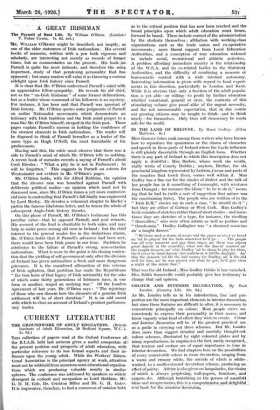A GREAT- IRISHMAN
The Parnell of Real Life. By William O'Brien. (London : T. Fisher Unwire. 7s. 6d. net.) Ma. WILLIAM O'BRIEN night "be described, not ineptly, as one of the elder statesmen of Irish nationalism. His several books of memoirs, written with a pen both vigorous and scholarly, are interesting not merely as records of former times, but as commentaries on the present. His book -j?n - Parnell_ is_ quite the most intimate, and therefore = the most important, study of that perplexing personality that has • appeared ; but many readers will value it as throwing a curious sidelight upon Irish history since Parnell.
.It is clear that Mr. O'Brien understood Parnell's mind with an appreciative fellow-sympathy. He reveals his old: chief, not as the " un-Irish Irishman " of some former delineations, but as a leader whose command of his followers is no mystery. For instance, it has been said that Parnell was ignorant of Irish history. Mr. O'Brien quotes some judgments of Parnell on earlier Nationalist movements which demonstrate an intimacy with Irish tradition and the Irish mind proper to a - man like Mr. O'Brien himself, steeped in the Irish past. These pages explain Parnell's success in holding the confidence of the sternest elements in Irish nationalism. - The reader will be disposed to think of Parnell hereafter as a leader of the same type as Hugh O'Neill, the most formidable of his predecessors. .
Having said this, the critic must observe that there was a side to Parnell's mind of which Mr. O'Brien tells us nothing. A recent book of memoirs records a saying of Parnell's about Cecil Rhodes : " What a pity he is not in Parliament ; he • will be forgotten." This suggests in Parnell an esteem for Westminster not evident in Mr. O'Brien's pages.
Mr. O'Brien holds, with Sir Alfred Robbins, the opinion . that the divorce case was launched against Parnell with deliberate political malice—an opinion which need not be discussed now, since Mr. O'Brien raises a yet more controver- sial issue in contending that Parnell's fall finally was engineered by Lord Morley. He devotes a vehement chapter to Morley's part in the famous Gladstone letter, and he traces the whole of subsequent Anglo-Irish history thereto.
On this phase of Parnell, Mr. O'Brien's testimony has this peculiar value—that he opposed Parnell, and now retracts. His account of the _feud is charitable to both sides, and may help to make peace among old men in Ireland ; but the chief interest to the general reader lies in the deductions drawn. Mr. O'Brien holds that if Parnell's advances had been met, there would have been Irish peace in our time. Partition he attributes to the failure of Parnell's strong, non-sectarian nationalism. What is more to the point is his closing conten- tion that the yielding of self-government only after the division of Ireland has given nationalism a fresh and more dangerous grievance. It is the considered affirmation of this veteran of Irish agitation, that partition has made the Republicans " the true heirs of that legacy of Irish nationality for the sake of which some thirty generations of Irishmen have, in one form or another, waged an undying war." Of the London Agreement of last year, Mr. O'Brien says : " The rejoicings of those who can discern here the elements of a genuine Irish settlement will be of short duration." It is an odd moral with which to close an account of Ireland's greatest parliamen- tary leader.


























































 Previous page
Previous page